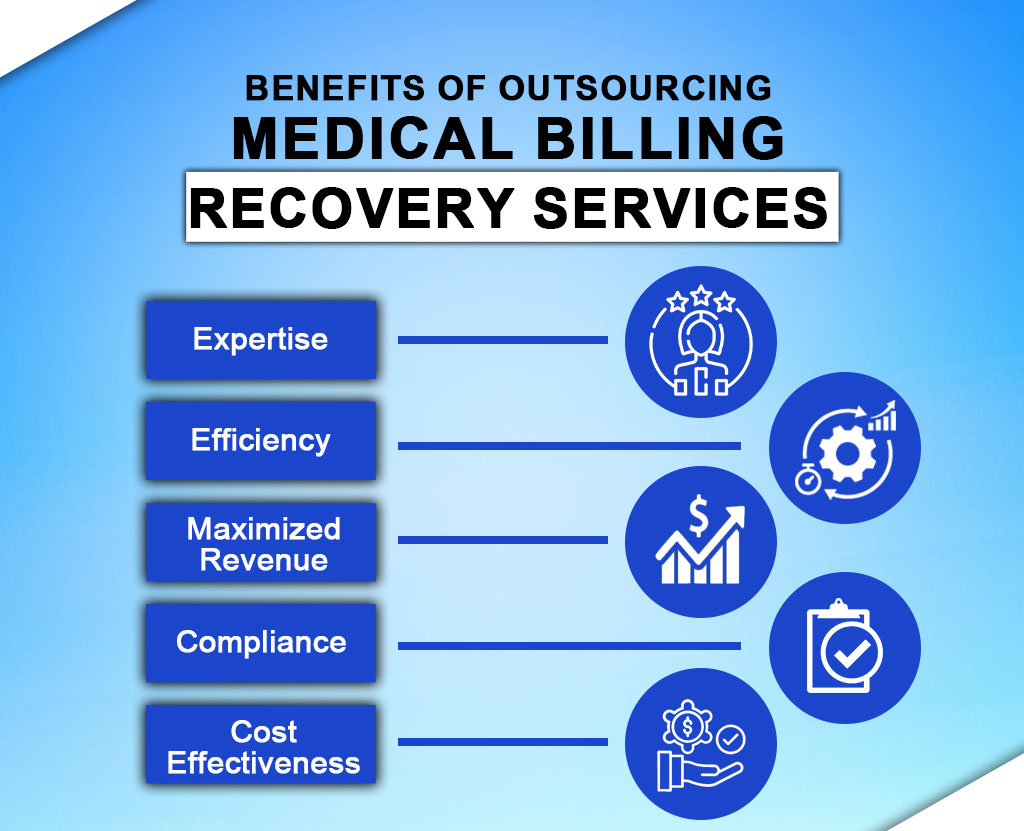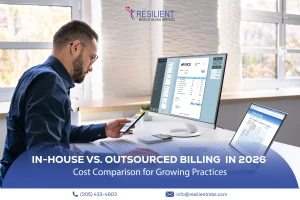Medical practitioners’ financial health depends on efficient medical billing and collection in the dynamic healthcare landscape. Medical billing and collection entails submitting and following up on health insurance claims to get paid.
It’s vital to healthcare providers’ revenue cycles and patient care. Effective medical billing and collection can lower AR days and boost cash flow for practices.
According to the American Medical Association (AMA), up to 25% of claims are denied by insurance companies, leading to significant revenue loss for healthcare providers. Medical billing errors cost the healthcare industry billions of dollars annually, with coding mistakes, duplicate billing, and incorrect patient information being common issues.
Understanding Medical Billing and Collection
Medical billing is the process of submitting and following up on claims with health insurance companies to receive payment for services provided by a healthcare provider. It involves translating medical services into billing codes, submitting claims to insurance companies, and ensuring the timely collection of payments.
Key Steps in the Medical Billing and Collection Process
- Patient Registration
- Insurance Verification
- Billing Code
- Claim Submission
- Adjudication
- Payment Posting
- Denial Management
- Patient Billing
Strategies for Effective Medical Billing and Collection
Improve Billing Accuracy and Efficiency
Patient details and insurance information should be clear and correctly written down. It is important to cross-check the billing codes to prevent mistakes that are likely to cause claim denials. Some of the procedures that should be followed include Ensuring that the billing software is updated, at least according to current regulations.
Emphasize Proper Documentation and Coding
Recent shocks on the increased cost of inflation should be met with a cut down on spending where the clerical staff should be trained on the importance of documenting things accurately.
One of the most critical changes that should be introduced is a steady and robust system of documenting the work done. Frequently, self-check and code documentation about compliance with established standards.
Utilize Technology for Streamlining
Billing in a health facility can be very complex. Therefore, consider using efficient software that performs such tasks and leaves no room for mistakes. Employ electronic health records (EHR) for the evaluation of documentation and the billing of processes. To ensure that reimbursement is made quickly, it is recommended that the insurance company use electronic claim submission.
Importance of Medical Recovery Services
Medical recovery services involve attempts to collect unpaid debts and work to resolve open account balances on behalf of physicians and other healthcare facilities. These services are essential in increasing the revenue generated by medical practices and minimizing preventable losses.
Benefits of Outsourcing Medical Recovery Services

Expertise
Medical recovery services can benefit from the billing and collection experience of medical practice with specialized knowledge and expertise in billing processes.
Efficiency
Outsourcing helps healthcare providers with their direct work as patient advocates and allows those specializing in billing and collections to do their jobs.
Maximized Revenue
The outcome of calling professional recovery services is increased revenues since the percentage of unpaid claims that can be recovered is higher.
Compliance
These services call for compliance with health regulations and issues to do with billing.
Cost-Effectiveness
Outsourcing is perhaps more economical since it eliminates the vice of forming an in-house billing and collection team.
The Role of Medical Billing and Collection Professionals
Medical billing and collection professionals have specific responsibilities when it comes to billing procedures in healthcare facilities.
Medical billing is one of the cornerstones of the modern healthcare system, as it coordinates and manages how providers get paid for services rendered. Their duties are not limited to filing claims; they are vital players in the medical practices’ fiscal condition and required compliance with billing codes.
Key Responsibilities of Medical Billing Professionals:
Claims Processing
Telling insurance companies of loss, damages, and other claims correctly and within the right time.
Coding
Adapting phrases associated with medical procedures and diagnoses to international code numbers for insurance reimbursement.
Insurance Verification
Coordinating patient appointments by confirming the patient insurance plan to establish the scope of the policy, allowing for the services to be rendered.
Billing Inquiries
Assisting patients in responding to details and questions related to billing and insurance claims.
Payment Posting
Incoming cash from insurance firms and patients and keeping records of payments.
Claim denial
This involves addressing situations that inhibit claim payment and re-submission of the same if the initial submission is rejected.
Compliance
Making sure that the billing procedures adhere to lawful standards governing the health industry.
Medical billing methods assist healthcare professionals get paid on time and well. Medical offices depend on their correct coding, billing, and claims processing expertise for revenue growth and survival.
Start Raising your Profits Today
Medical billing and collection may be a bit of an enigma to some people, but when you spend some time and effort learning what is necessary, the benefits and rewards will come later.
There are some essential things that you studied under the payers must do for yourself to design a better billing process; however, your overall revenue mostly depends on your payor contracts. Insurance collections form the basis of operations for most healthcare facilities as they fund the daily running.
Yielding to the pressure to reduce rates and optimizing contracts can be considered a crucial activity if your company aims to succeed and expand its sphere of activity. That’s where Resilient MBS comes in.
Improve Your Billing Process with Resilient MBS
Every healthcare facility faces different medical billing collection issues. However, several standard techniques can speed up the process.
Traditional workflows sometimes fail to collect patient payments. Due to this, many healthcare providers submit unpaid bills to collections agencies, receiving only $0.30 per dollar invoiced.
This is financially unsustainable and burdens patients. There are more efficient and patient-friendly billing and collection methods.
Resilient MBS helps healthcare companies increase payment collections by 10-20%. Request a medical billing and collections process optimization demo today.
Read More: Urology Coding: Guidelines And Challenges









